2020 Speakers
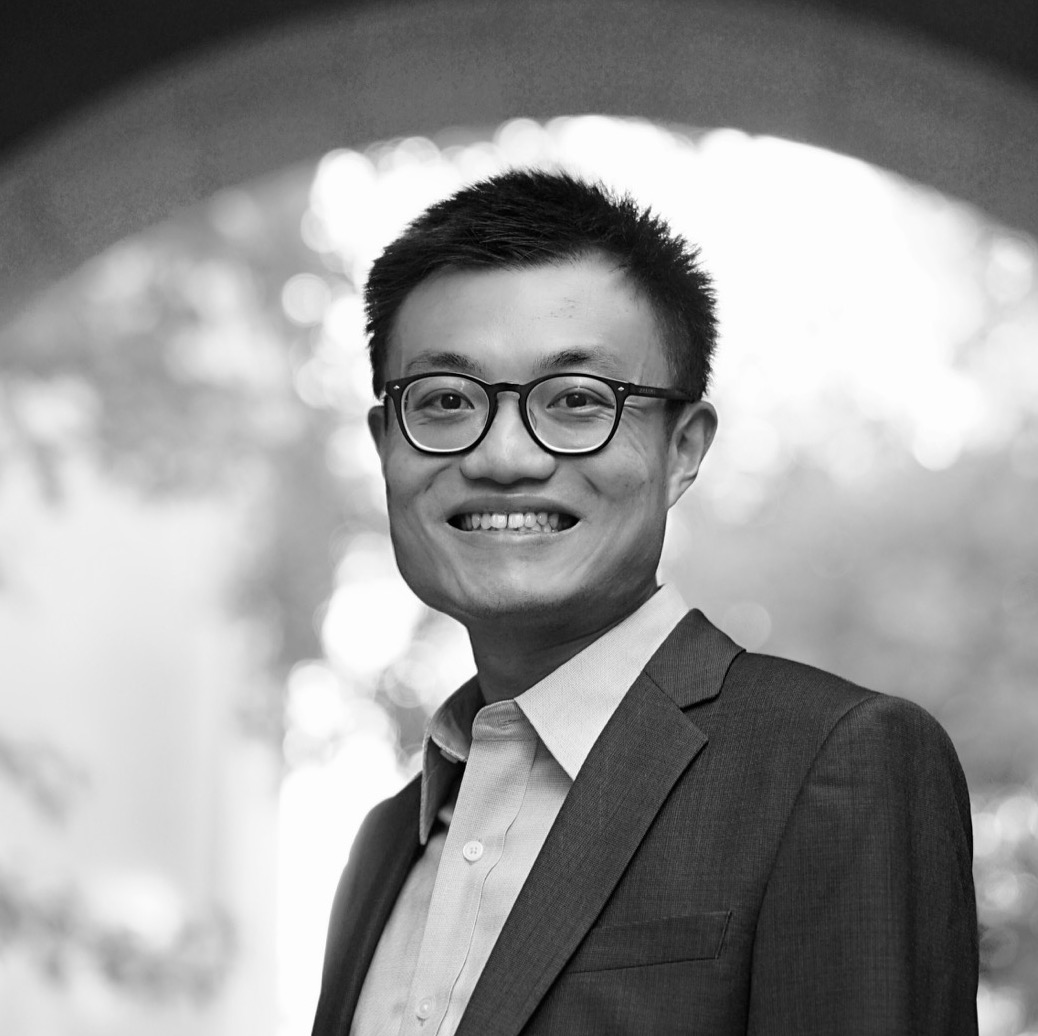
David Yang, Prize Fellow in Economics, History, and Politics, Harvard University
Data-intensive Innovation & the State: Evidence from AI Firms in China
February 18 | 4 PM
116 McElhinney Hall
Abstract: Data-intensive technologies such as AI may reshape the modern world. We propose that two features of data interact to shape innovation in data-intensive economies: first, states are key collectors and repositories of data; second, data is a non-rival input in innovation. We document the importance of state-collected data for innovation using comprehensive data on Chinese facial recognition AI firms and government contracts. Firms produce more commercial software and patents, particularly data-intensive ones, after receiving government public security contracts. Moreover, effects are largest when contracts provide more data. We then build a directed technical change model to study the state’s role in three applications: autocracies demanding AI for surveillance purposes, data-driven industrial policy, and data regulation due to privacy concerns. When the degree of non-rivalry is as strong as our empirical evidence suggests, the state’s collection and processing of data can shape the direction of innovation and growth of data-intensive economies.
About the Speaker: David Yang’s research focuses on political economy, behavioral and experimental economics, economic history, and cultural economics. In particular, David studies the forces of stability and forces of changes in authoritarian regimes, drawing lessons from historical and contemporary China. David received a B.A. in Statistics and B.S. in Business Administration from University of California at Berkeley, and PhD in Economics from Stanford. David is currently a Prize Fellow in Economics, History, and Politics at Harvard and a Postdoctoral Fellow at J-PAL at MIT. He will join Harvard Economics Department as an Assistant Professor in 2020.
Co-hosted with the Economics Department
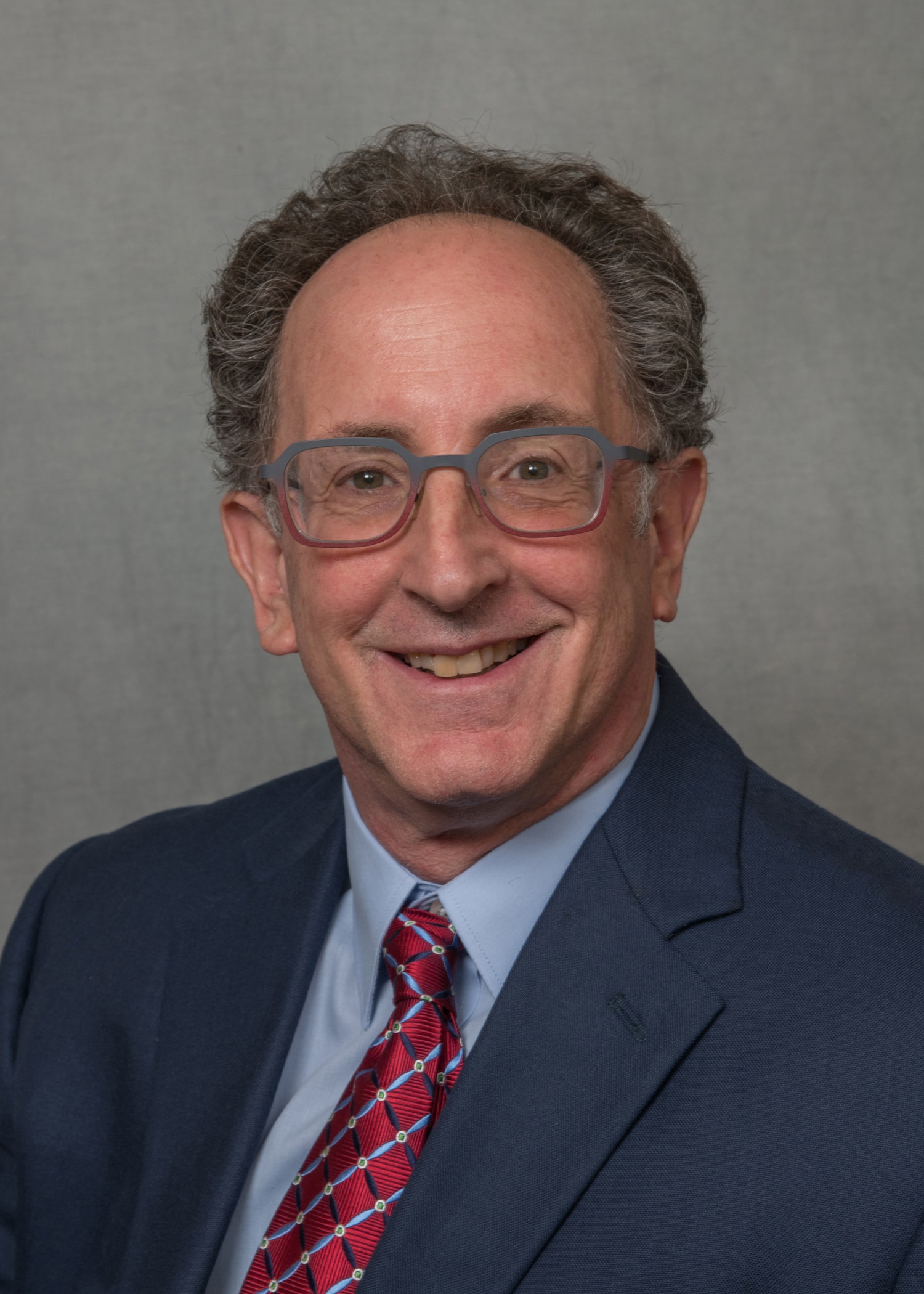
Lawrence Rothenberg, Corrigan-Minehan Professor of Political Science and is Director of the W. Allen Wallis Institute of Political Economy Science
Why Go Public...and to What Effect?
(co-authored with Jinhee Jo)
February 25 | 4 PM
116 McElhinney Hall
Abstract: Presidential appeals to the electorate have grown markedly over past decades. However, while insightful, empirical scholars have had difficulty establishing the impacts of such efforts. One possible reason is that microfoundations are underdeveloped. Hence, we analyze a model where the president can potentially raise the public profile of an issue and, contrary to past theoretical work, send a signal about the quality of one option relative to another while considering a variety of costs and benefits. Our results indicate that the president's going public is not always associated with observable success-indeed, sometimes failure is guaranteed-and, yet, better choices are likely given the existence of the going public option relative to a hypothetical world without it. Results are largely robust to allowing the chief executive to signal privately without public observance of information transmission. Our findings make sense of existing empirical scholarship and have important implications for future work.
About the Speaker: Lawrence Rothenberg (Ph.D., Stanford University) is Corrigan-Minehan Professor of Political Science and is Director of the W. Allen Wallis Institute of Political Economy Science at the University of Rochester. He has also been a member of the Social Science faculty at the California Institute of Technology, the Bradley Fellow in Political Economy at the Carnegie Mellon’s Graduate School of Industrial Administration (Tepper School), and the Max McGraw Distinguished Professor of Environmental Management and the Director of the Ford Center for Global Citizenship at Northwestern University’s Kellogg School.
Co-hosted with the Economics Department
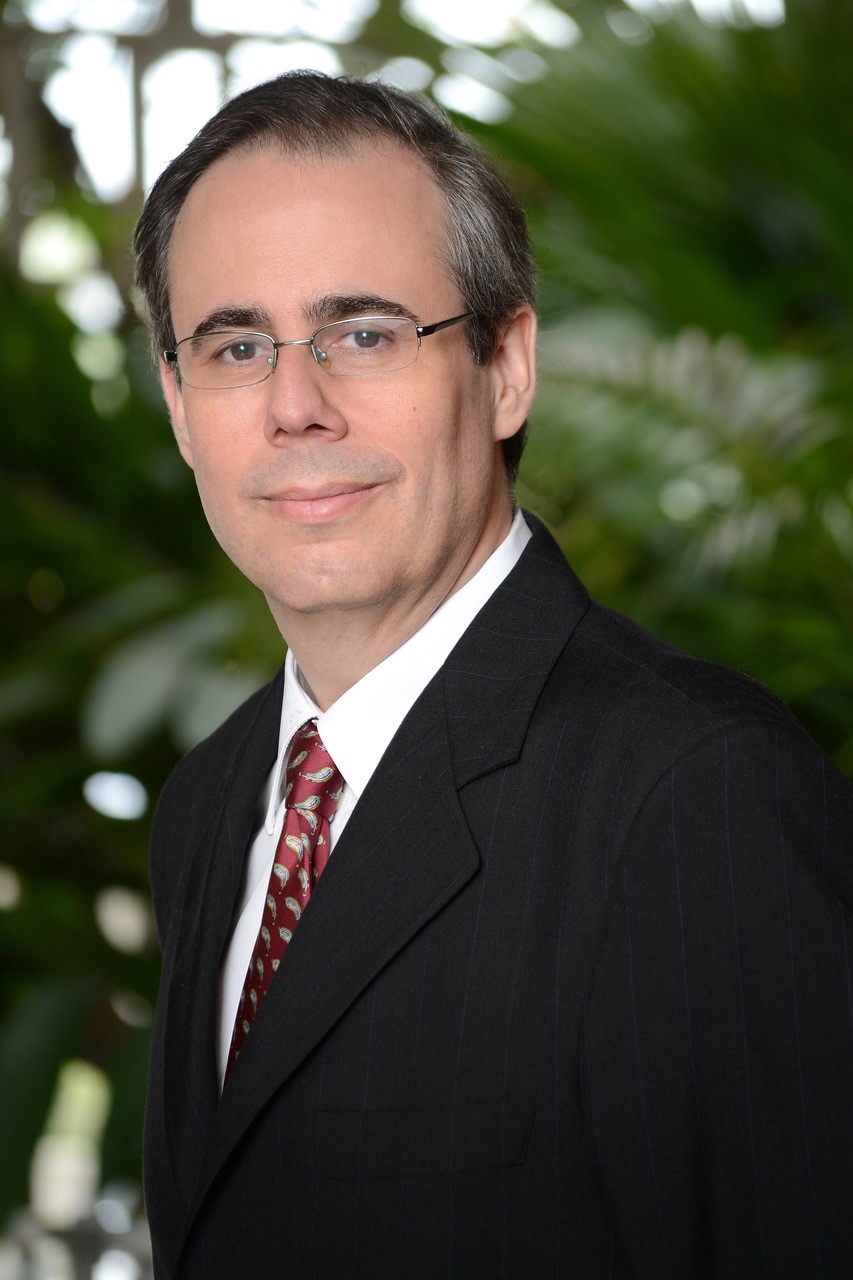
Francisco J. Monaldi, PhD, Center for Energy Studies, Rice University
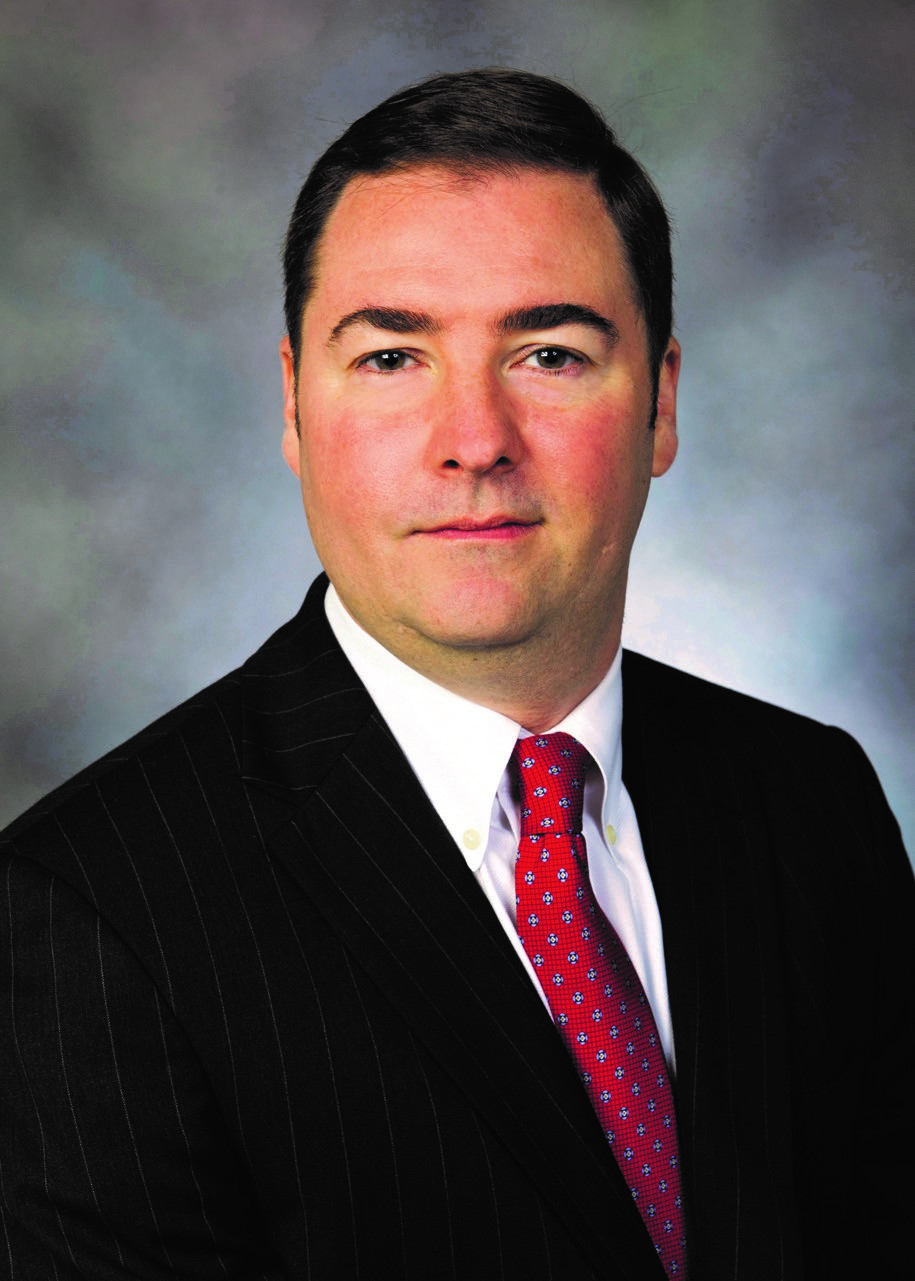
Mark Jones, PhD, James A. Baker III Institute, Rice University
March 6 |10:30 AM
116 McElhinney Hall
Abstract: Argentina is a risky place for foreign oil investors. Frequent political swings from the neoliberal right to the populist left, weak enforcement of contracts and property rights, endemic corruption and a volatile macroeconomic environment; in a region that has witnessed multiple waves of resource nationalism, Argentina stands out as a serial violator of debt and other obligations. And yet, over the past few years, foreign investors have been willing to overlook these red flags and invest in Argentina’s oil and natural gas sector. We argue that shale is a much less attractive target for expropriation than conventional oil and gas production. Unlike conventional extraction, shale has very short production cycles and lower sunken investments. Conventional wells can produce prolifically for a decade or longer. By contrast, a shale well’s production peaks in the first few weeks and then undergoes a rapid decline. If Argentina or any government were to expropriate shale investments, or otherwise impose terms that render them unattractive, shale drilling would stop. Given the steep decline rates that characterize shale wells, production would soon collapse. And the government would quickly find itself with little production or cash flow to move forward with the expropriation.
About the Speakers: Dr. Monaldi is the Fellow in Latin American Energy Policy and Director of the Latin
American Energy Program at Center for Energy Studies at Rice University’s Baker Institute
for Public Policy. He is the Founding Director and Professor at the Center for Energy
and the Environment at IESA in Caracas. He has been a Visiting Professor at Harvard,
Stanford, Tufts, Universidad de los Andes, and the Tecnologico de Monterrey; and a
Fellow at Hoover Institution, Columbia’s Center for
Global Energy Policy, and the Belfer Center. He holds a Ph.D. from Stanford University
and a Masters from Yale University.
Dr. Jones is the Joseph D. Jamail Chair in Latin American Studies, the James A. Baker
III Institute for
Public Policy’s Political Science Fellow, the Director of the Master of Global Affairs
Program, and a Professor of Political Science at Rice University. Jones is also a
Research Associate at the University of Houston’s Hobby School of Public Affairs and
a Non-Resident Fellow at the Center for Strategic and International Studies (CSIS).
Jones received his B.A. from Tulane University and his Ph.D. from the University of
Michigan.
Co-hosted with the UH Energy
Political Economy Speaker Series*
Maria Petrova, Universitat Pompeu Fabra
September 18 | 10 AM
Location: Zoom Video Conference
Automation, Career Value, and Political Preferences
Abstract: Recently, there has been much evidence linking economic shocks in the form of automation to employment and wage outcomes, as well as political outcomes. In this paper, we try to understand the mechanisms through which economic and political effects of automation are linked. In particular, we go beyond current worker outcomes by introducing a new measure of future career prospects. We show that automation does not only affect current wages but that occupations also differ in the degree to which workers' career is affected by automation, as automation affects both wages in jobs that workers might aspire to move into and the likelihood of different career moves. Moreover, the labor market effects of automation differ by demographic group and local area characteristics. We then demonstrate that these patterns of heterogeneity in the impact of automation align with shifts in voter preference towards Donald Trump in the 2016 election -- with negative impacts predicting a shift in preference towards Trump.
About the Speaker: Maria Petrova is an ICREA Research Professor at the Universitat Pompeu Fabra, Researcher at the Barcelona Institute for Political Economy and Governance (IPEG), Affiliate Professor at Barcelona Graduate School of Economics, and Alfa-Bank Associate Professor of Economics at the New Economic School. She is also a Research Fellow at CEPR. She is co-editor of the Journal of Public Economics and a member of the Editorial Board of the Review of Economic Studies. She has a Ph.D. from Harvard University. She spent 2012-2013 as a Visiting Research Scholar at the Center for Democratic Politics at Princeton University. Her research interests include political economy, mass media economics, and corporate governance.
CPP Speaker Series**
**Jointly sponsored with Macroeconomics seminar
Hosted by German Cubas, https://sites.google.com/site/macroseminaruh/
Ignacio Esponda, UC Santa Barbara
September 21 | 4 PM
Virtual
The seminar will be hosted on Zoom. To join the virtual seminar please send an email to Prof. German Cubas (gcubasnorando@uh.edu), so he can provide you the link to the seminar and expect to admit you from the Zoom waiting room.
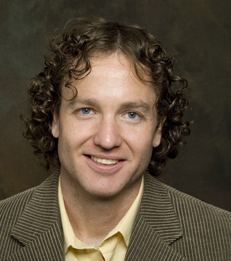
“Equilibrium in Misspecified Markov Decision Processes,” joint with Demian Pouzo (UC Berkeley)
Abstract: We provide an equilibrium framework for modeling the behavior of an agent who holds a simplified view of a dynamic optimization problem. The agent faces a Markov decision process, where a transition probability function determines the evolution of a state variable as a function of the previous state and the agent’s action. The agent is uncertain about the true transition function and has a prior over a set of possible transition functions; this set reflects the agent’s (possibly simplified) view of her environment and may not contain the true function. We define an equilibrium concept and provide conditions under which it characterizes steady-state behavior when the agent updates her beliefs using Bayes’ rule.
About the Speaker: Ignacio Esponda is the current Walter J. Mead Chair in Economics holder. Professor Esponda is an economic theorist who specializes in studying learning by people with possibly misspecified models of the world and in integrating theoretical and experimental economics. His work has been published in journals such as Econometrica, the American Economic Review, and the RAND Journal of Economics.
Presidential Election Roundtable Series*
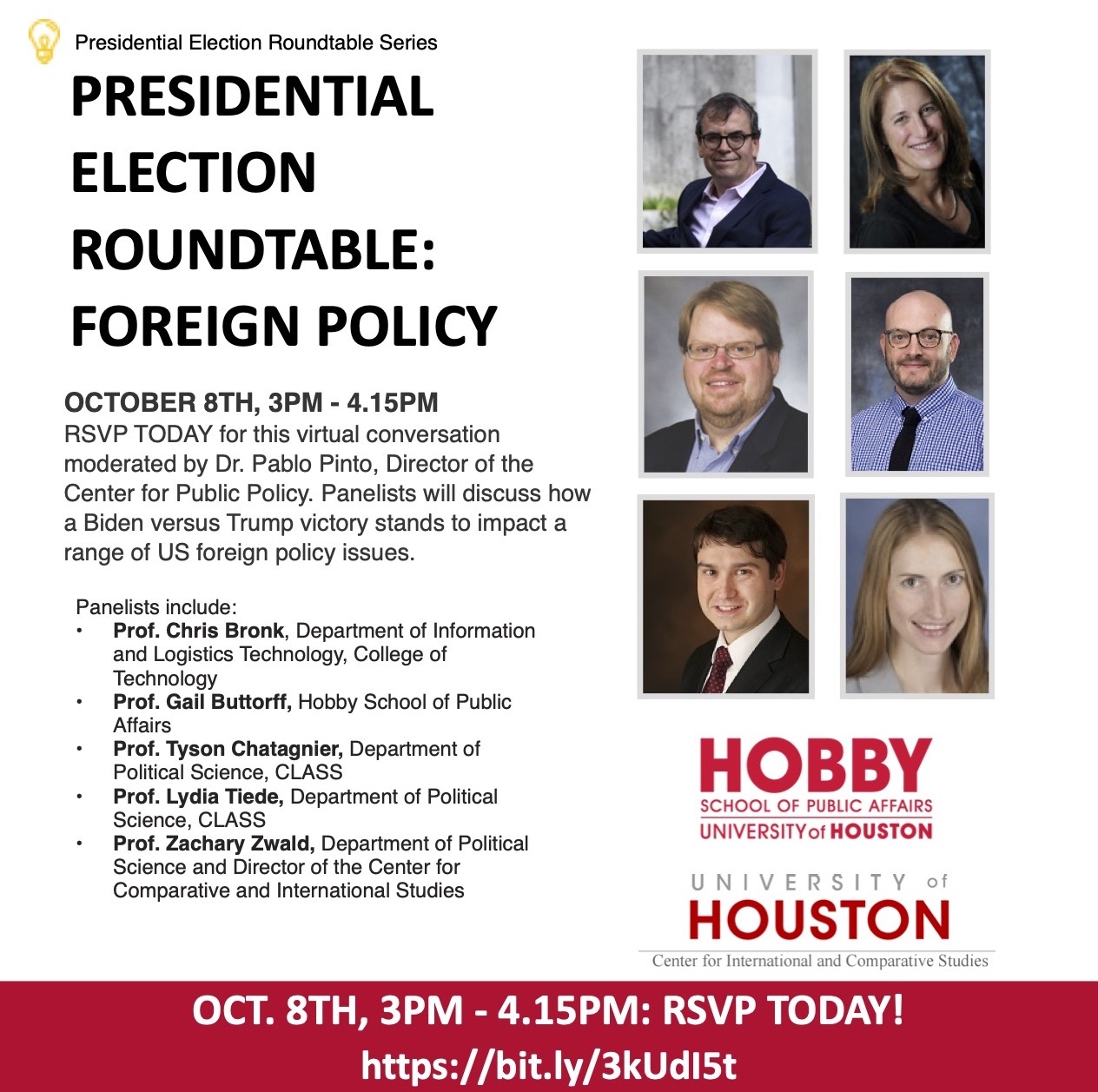
October 8| 3 PM
Presidential Election Roundtable: Foreign Policy
A virtual conversation moderated by Dr. Pablo Pinto, Director of the Center for Public Policy. Panelists will discuss how a Biden versus Trump victory stands to impact a range of US foreign policy issues.
Co-sponsored with Center for International and Comparative Studies
Presidential Election Roundtable: Domestic Policy Issues in the 2020 Election
October 19th at 3pm – 4:15pm
Summary: Roundtable on domestic policy issues in the presidential campaign
This is the second event in the Presidential Election Roundtable Series. The event is hosted by the Hobby School's CPP and CLASS's Center for Comparative and International Studies. Participants include Dean Kirk P. Watson, Profs. Elizabeth Simas, Ryan Kennedy, Johanna Luttrell, Pablo Pinto. Moderated by Zachary Zwald.
Political Economy Speaker Series*
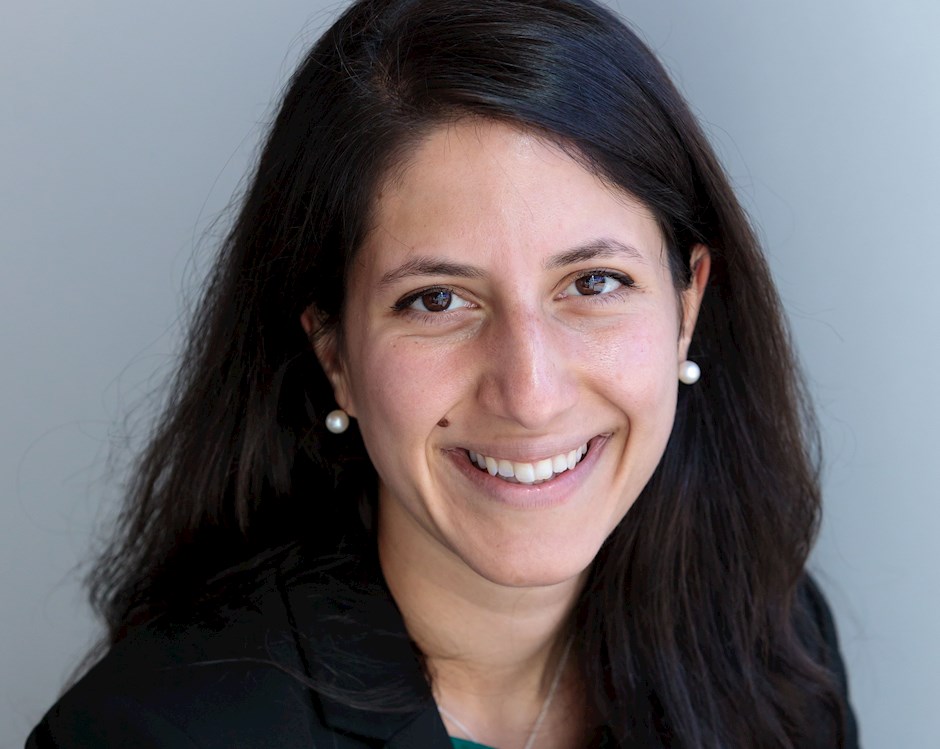 Sarah Moshary, University of Chicago Booth School of Business
Sarah Moshary, University of Chicago Booth School of Business
“Deregulation through Direct Democracy: Evidence from Liquor Markets” (with Gaston Illanes)
October 27 | 4 PM to 5:15 PM Central time
University of Houston Zoom Video Conference (hosted by Aimee Chin)
Everyone interested in attending this virtual seminar must register in advance to receive the Zoom meeting link (each registrant gets a unique link to enter meeting).
Abstract: This paper examines the merits of state control versus private provision of spirits retail, using the 2012 deregulation of liquor sales in Washington state as an event study. This is the first shift from a public to a private system for spirits sales in the United States since Prohibition. We document effects along a number of dimensions: prices, product variety, convenience, substitution to other goods, state revenue, and consumption externalities. We estimate a demand system to evaluate the net effect of privatization on consumer welfare. Our findings suggest that deregulation harmed the median Washingtonian, even though residents voted i favor of deregulation by a 16% margin. Further, we find that vote shares for the deregulation initiative do not reflect welfare gains at the ZIP code level. We discuss implications of our findings for the efficacy of direct democracy as a policy tool.
About the speaker: Prof. Sarah Moshary is Assistant Professor of Marketing at the University of Chicago Booth School of Business. Prof. Moshary earned a PhD in economics from Massachusetts Institute of Technology and an AB in economics from Harvard College. Her research interests span from industrial organization to political economy, including work on digital and political advertising, price obfuscation in e-commerce, and supply responses to government policy.
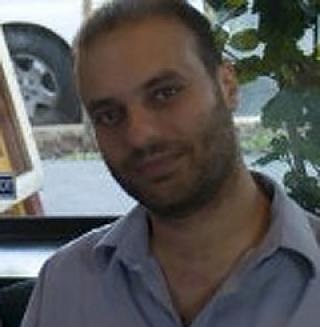 Ethan Kaplan, University of Maryland
Ethan Kaplan, University of Maryland
School Desegregation and Political Preferences: Long-Run Evidence from Kentucky”
Date: November 17, 2020
Time: 4:00 to 5:15 PM Central time
Location: University of Houston Zoom Video Conference (hosted by Aimee Chin)
Register Here
Abstract: In 1974, a federal court ordered that public schools in Jefferson County, KY be desegregated. To achieve racial integration, students were assigned to a busing schedule that depended on the first letter of their last name. This led to quasirandom variation in the number of years of busing and, for the initial cohorts, whether individuals were bused at all. We exploit this variation to estimate the long-run impact of busing on political participation and preferences. Focusing on white males, we do not detect any effect on voter turnout. We do, however, find that busing significantly increases Democratic party alienation more than forty years later. Consistent with the idea that attending a formerly black, inner-city school causes a change in the broad ideological outlook of whites, we also find that bused individuals are less likely to donate to organizations that advocate for conservative causes.
About the speaker: Ethan Kaplan is an Associate Professor of Economics at the University of Maryland. Dr. Kaplan obtained his Ph.D. from UC Berkeley in 2005. His main area of research is empirical political economy and applied micro-econometrics, focusing on media economics, the determination and persistence of political preferences, interest group behavior, and the political economy of U.S. intervention.
*Jointly sponsored with the Empirical Microeconomics Seminar,
hosted by Aimee Chin, https://uh.edu/~achin/workshop/
**Jointly sponsored with Macroeconomics seminar
Hosted by German Cubas, https://sites.google.com/site/macroseminaruh/
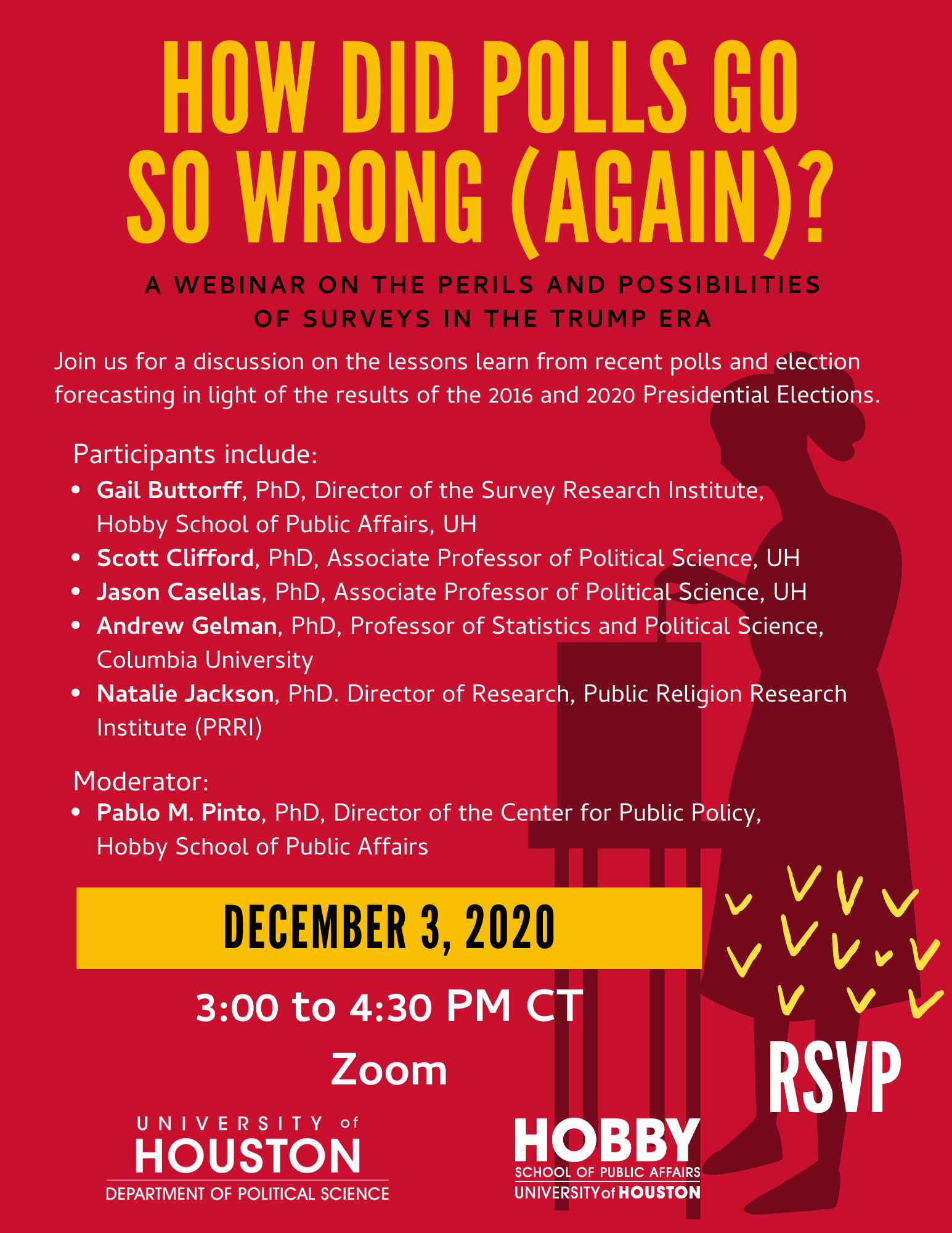 How Did Polls Go So Wrong (Again)?
How Did Polls Go So Wrong (Again)?
A webinar on the perils and possibilities of surveys in the Trump era.
December 3, 2020
Time: 3:00 pm to 4:30 PM CT
Join us for a discussion on the lessons learned from recent polls and election forecasting in light of the results of the 2016 and 2020 Presidential Elections.
Participants include the following:
Gail Buttorff, PhD, Director of the Survey Research Institute, Hobby School of Public
Affairs, UH
Scott Clifford, PhD, Associate Professor of Political Science, UH
Jason Casellas, PhD, Associate Professor of Political Science, UH
Andrew Gelman, PhD, Professor of Statistics and Political Science, Columbia University
Natalie Jackson, PhD. Director of Research, Public Religion Research Institute (PRRI)
Moderated by:
Pablo M. Pinto, PhD, Director of the Center for Public Policy,Hobby School of Public Affairs
Co-hosted with the Department of Political Science
Political Economy Speaker Series*